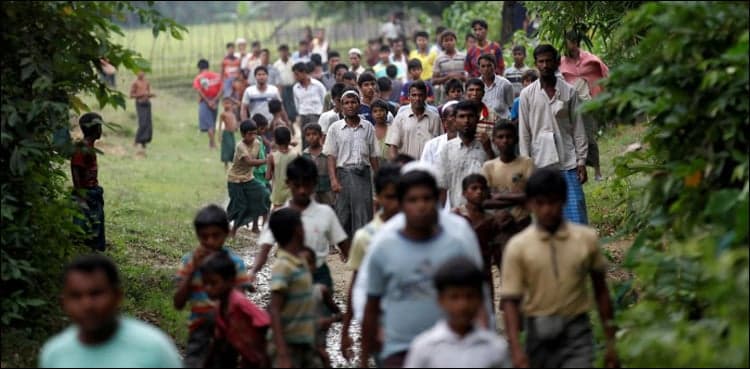
Myanmar Destroys 150 Scam Centers Near China Border
Military cracks down on major online fraud hubs near Thai border as pressure mounts from China and neighboring nations
YANGON — A Major Crackdown on Border Scam Hubs
Myanmar’s military announced on Sunday that it had demolished nearly 150 buildings linked to a sprawling internet scam operation along the country’s southeastern border with Thailand. The sites, according to the state-run Global New Light of Myanmar, included luxury dormitories, a karaoke lounge, a gym, spa, and even a four-story private hospital, all part of a self-contained criminal compound that thrived on global online fraud.
The military operation marks one of the largest physical crackdowns yet on the transnational scam industry that has flourished in Myanmar’s lawless frontier regions since the country’s 2021 coup. These compounds, often guarded and heavily fortified, have become infamous for employing — and sometimes enslaving — thousands of workers forced to conduct romance scams, crypto fraud, and investment schemes targeting victims worldwide.
Inside the Scam Compounds
The demolished site lies in an area long controlled by local militias and border businesses operating outside the government’s full control. Witnesses told local media that military bulldozers and controlled explosives were used over several days to flatten the compound’s buildings. Videos shared online showed massive plumes of smoke and dust rising near the border, while Thai villagers across the river reported hearing loud explosions and machinery at night.
Officials confirmed that the operation targeted a notorious complex once considered untouchable — a vast, high-security enclave featuring casinos, entertainment centers, and worker dormitories. Some of these facilities had been transformed into “online command centers” where trafficked laborers conducted digital scams.
A spokesperson from Myanmar’s State Administration Council (SAC) said the demolition was part of an ongoing campaign “to restore rule of law in the border region and eliminate cybercrimes that tarnish the nation’s image.”
Trafficking, Exploitation, and Forced Labor
The scam centers have long been accused of running human trafficking networks that lure job seekers from across Asia — including China, Thailand, and Malaysia — with promises of high-paying tech jobs. Upon arrival, victims often have their passports confiscated and are forced to operate online scams under constant surveillance and threat of violence.
Rights groups estimate that tens of thousands of people are trapped in such compounds across Myanmar’s Shan, Kayin, and Kachin states. Many are beaten or sold between criminal networks if they fail to meet their fraud “quotas.”
One humanitarian worker, speaking anonymously for safety, said:
“The scale of these compounds is staggering. Some are run like private cities — they have hotels, gyms, hospitals, even their own power generators — all built on human suffering and deception.”
KK Park and the Wider Crackdown
The crackdown follows a September raid on the infamous KK Park compound, another major scam center located near the Thai border town of Myawaddy. During that operation, security forces reportedly detained over 2,000 suspected scammers, while about 1,500 others fled into Thailand.
Local sources in Mae Sot, Thailand, said that hundreds of Myanmar nationals who escaped the raids are now in temporary shelters, awaiting deportation or relocation. Thai police have increased border patrols amid fears that remaining scammers might regroup elsewhere.
Since the demolition campaign began, locals have reported intermittent explosions as the military continues to level buildings suspected of housing scam operations or illegal casinos. Satellite imagery released by independent analysts shows significant destruction in the targeted areas.
China’s Pressure and Myanmar’s Balancing Act
China has been pressuring Myanmar’s junta for months to take action against scam syndicates that predominantly target Chinese citizens. Beijing’s state media has repeatedly condemned the “cross-border online fraud epidemic,” while Chinese police have collaborated with Myanmar and Thailand in joint repatriation operations.
Diplomatic analysts say the junta’s latest move is likely a strategic gesture to ease international criticism rather than a full-scale reform effort.
Dr. Hla Thein, a Yangon-based political analyst, said:
“These demolitions are highly choreographed. The junta wants to show Beijing it is cooperating, but it’s unlikely to dismantle every scam operation because these networks are deeply tied to regional militias and money flows.”
Indeed, many of these compounds are believed to generate millions of dollars monthly, feeding corruption networks and militia financing on both sides of the border. The demolitions, while dramatic, may represent a public relations campaign more than a permanent shutdown.
Earlier Interventions and Starlink Connection
Prior crackdowns in 2023 led to the repatriation of more than 7,000 workers back to China, while Thailand and Laos launched joint cybercrime task forces. However, investigators later found that some scam centers had evaded network shutdowns by using Starlink satellite internet receivers provided through illicit channels.
After the news broke, SpaceX confirmed it had disabled unauthorized Starlink access in parts of Myanmar’s border zones, cutting connectivity to several known scam compounds.
Despite these measures, reports indicate that new centers often emerge under different names or relocate deeper into remote jungle areas where central oversight is minimal.
The Human Cost
For victims, the crackdown is both a relief and a tragedy. Many have endured torture and starvation within the compounds. Humanitarian organizations are now calling for safe rescue and rehabilitation programs for those liberated from the sites.
“Demolishing buildings is only one part of the solution,” said a representative from an anti-trafficking NGO.
“These people need psychological care, legal support, and safe repatriation. Otherwise, they will end up re-trafficked.”
Observers also worry that as the junta intensifies military activity in border areas, clashes with ethnic armed groups may worsen, leading to further instability and displacement.
International Reactions
The Thai government welcomed the operation, stating that it was coordinating with Myanmar to prevent the scammers’ return. Chinese officials praised the “strong actions” but called for consistent and transparent enforcement.
Meanwhile, human rights groups urged independent monitoring, warning that Myanmar’s military has a history of using anti-crime campaigns as pretexts for controlling border trade and cracking down on dissent.
Conclusion
The destruction of 150 scam-related buildings signals Myanmar’s most visible attempt yet to dismantle its billion-dollar fraud industry. Yet analysts remain skeptical about how deep the crackdown will go.
While the world applauds the symbolic demolition, the true test lies in whether the junta will prosecute the masterminds behind these operations — many of whom remain protected by powerful militias and corrupt officials.
Until then, the fight against Myanmar’s cross-border scam networks remains far from over.
FAQs
1. Why did Myanmar demolish 150 buildings?
The military targeted illegal compounds near the Thai border used for online scam operations. These centers were linked to fraud, human trafficking, and illegal trade.
2. Where did the demolitions take place?
Most demolitions occurred in border regions such as Myawaddy and Shwe Kokko, notorious hubs for online scams and casino activities.
3. What kinds of scams operated there?
Scams included romance frauds, fake investment platforms, and cryptocurrency cons targeting victims in China, the U.S., and Southeast Asia.
4. Were people arrested?
Authorities detained thousands of suspected scammers during earlier raids, including more than 2,000 at the KK Park compound. Many others fled into Thailand.
5. How is China involved?
Many scam victims are Chinese citizens. China has pressured Myanmar to act and has collaborated on repatriation of trafficked workers and cross-border policing.
6. What happened to the trafficked workers?
Some were rescued and repatriated to China and Thailand. NGOs have urged better rehabilitation and protection to prevent re-trafficking.
7. Will this crackdown end online scams in Myanmar?
Experts believe it’s only a temporary measure. Without deep reform, corruption control, and regional cooperation, the scam industry is likely to resurface elsewhere.
Related posts:
 UN Special Rapporteur Report on Myanmar Rights
UN Special Rapporteur Report on Myanmar Rights
 Myanmar junta fortifies Sittwe as AA nears Rakhine
Myanmar junta fortifies Sittwe as AA nears Rakhine
 East Timor’s ASEAN Gamble: Mending Ties with Myanmar Junta
East Timor’s ASEAN Gamble: Mending Ties with Myanmar Junta
 ASEAN to Decide on Myanmar Election Observers in 2025
ASEAN to Decide on Myanmar Election Observers in 2025
 China Executes 5 from Myanmar Scam Gang in Fraud Crackdown
China Executes 5 from Myanmar Scam Gang in Fraud Crackdown
 Myanmar National Unity Government 2025 Faces Calls for Reform
Myanmar National Unity Government 2025 Faces Calls for Reform
